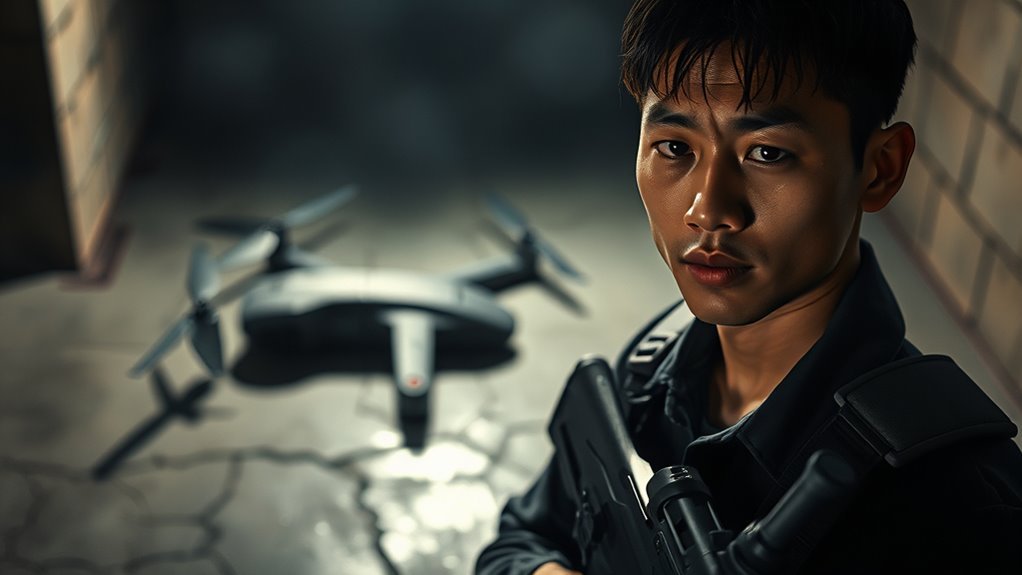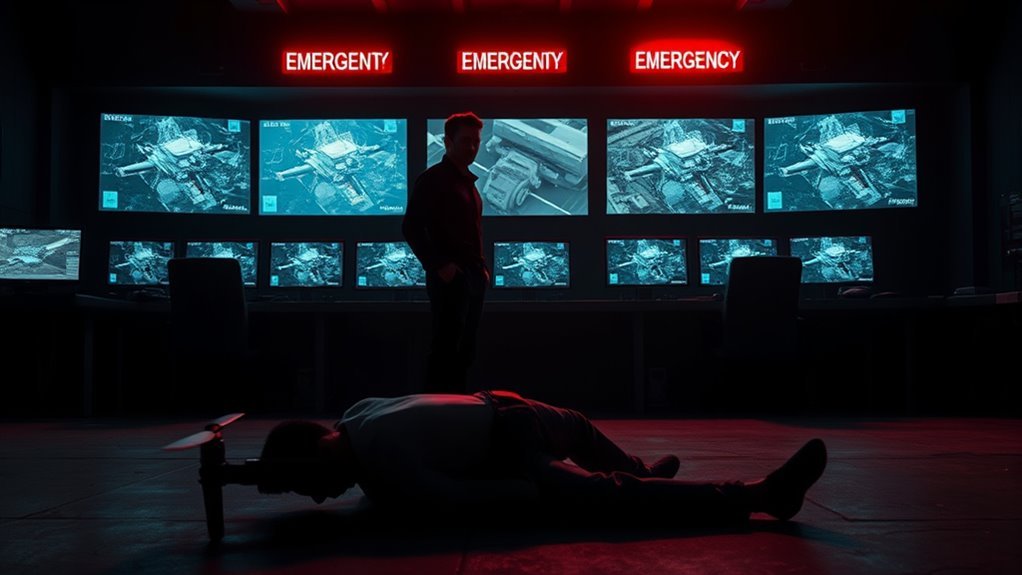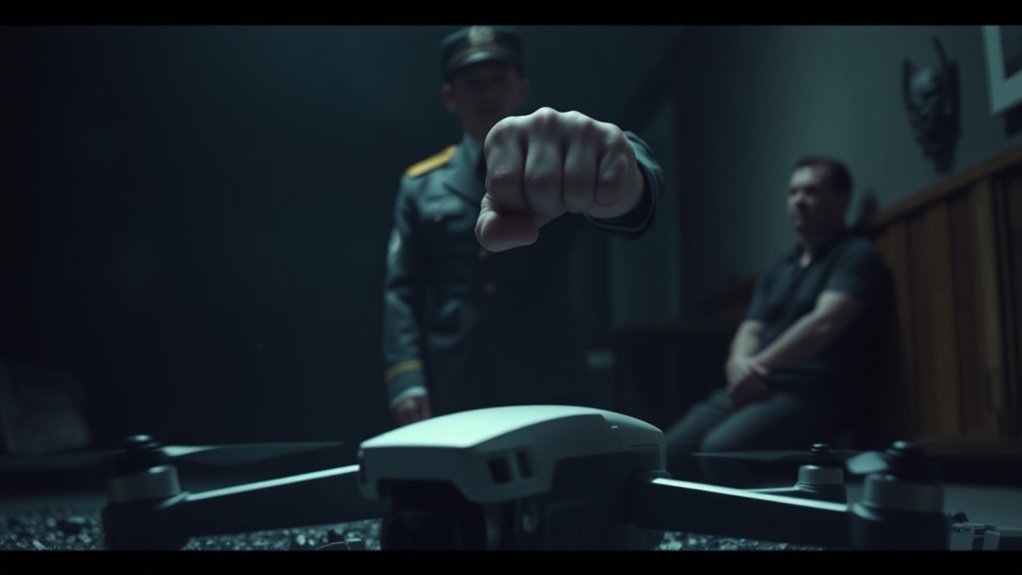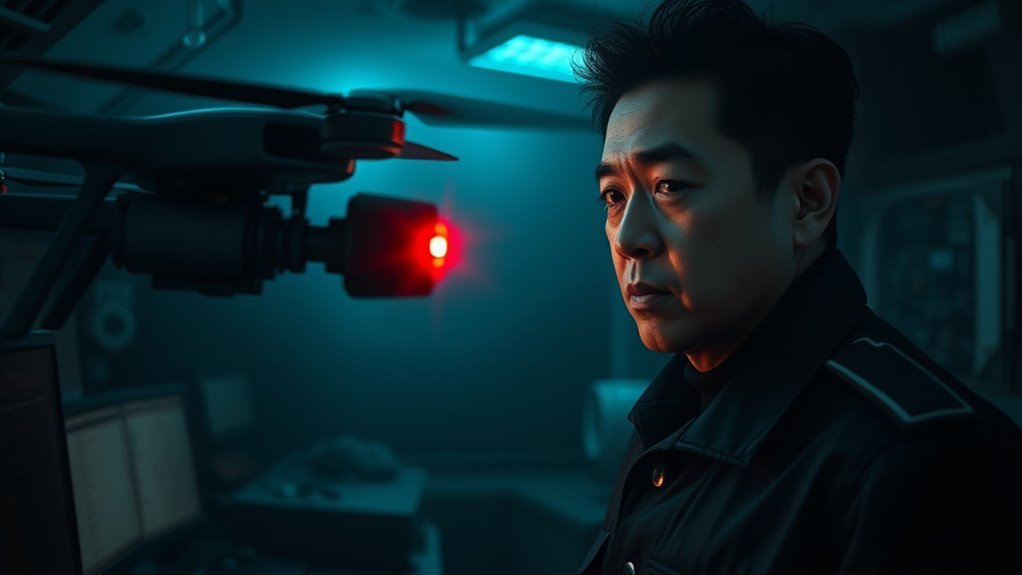Captain Park’s lethal confrontation with the drone operator arose from deep-seated tensions regarding ethics and strategy in drone warfare. Their differing views created a volatile environment, marked by miscommunication. Park’s military background influenced his perception of accountability and risk, while the operator’s casual demeanor clashed with this mindset. Emotional and personal factors further clouded judgment. To understand the broader implications of this incident and the future of warfare, one must examine the intricate dynamics at play.
The Background of Captain Park

Captain Park stands as a compelling figure in the domain of aviation and technology. With a robust military background, he’s navigated the complexities of leadership in high-stakes environments. But what drives his decisions? You might wonder how his experiences shape his approach to both innovation and strategy. Captain Park’s leadership is marked by a commitment to excellence, often reflecting on the discipline and teamwork instilled during his military service. This foundation enables him to tackle challenges with a unique perspective, balancing risk with calculated precision. As you explore his journey, consider how his military past informs his views on freedom, autonomy, and the ethical dilemmas of modern technology. His experiences may lead him to embrace AI-driven autonomous navigation, recognizing its potential to enhance safety and efficiency in drone operations. Additionally, his understanding of advanced safety features may influence his strategies for ensuring reliability and trust in new technologies.
Understanding Drone Warfare

As technology evolves, so does the nature of warfare, and understanding drone warfare is key to grasping the current landscape of military strategy. You might wonder how drone ethics play a role in this rapidly changing environment. Drones offer unprecedented advantages in combat technology, allowing for precision strikes and intelligence gathering with reduced risk to personnel. However, this technological prowess raises ethical questions about accountability, civilian casualties, and the psychological impact on operators. Are we sacrificing humanity for efficiency? As you analyze drone warfare, consider the balance between military necessity and moral responsibility. How can nations navigate these complex dilemmas while upholding the values of freedom and justice? The answers could shape the future of warfare and global relations. Furthermore, the integration of advanced sensor technology enhances real-time situational awareness, which is crucial for minimizing collateral damage in combat scenarios. Additionally, the use of AI-driven autonomy allows for improved decision-making and operational efficiency, which can further mitigate unintended consequences in military engagements.
The Incident: What Really Happened

What really went down during the incident? You might wonder how tensions escalated so quickly and what role miscommunication played in the unfolding events. Analyzing these factors could reveal deeper insights into the dynamics at play.
Tensions Escalate Rapidly
While the initial interaction between Captain Park and the drone operator seemed innocuous, underlying tensions quickly surfaced, revealing deeper issues at play. You might wonder how a casual encounter escalated into a tragic event. As the conversation progressed, it became clear that both parties held differing views on drone warfare, a topic fraught with moral and ethical implications. The operator’s casual demeanor clashed with Park’s military mindset, igniting a spark that only intensified. You could sense the escalating tensions as each side dug in, unwilling to compromise. The atmosphere thickened with unspoken frustrations and conflicting ideologies, ultimately leading to a volatile situation. What could have been a simple discussion morphed into a confrontation, illustrating how quickly misunderstandings can spiral out of control.
Miscommunication and Misunderstanding
Although the initial dialogue between Captain Park and the drone operator seemed straightforward, it quickly became a breeding ground for miscommunication and misunderstanding. You might wonder how a simple interaction could escalate into chaos. The communication breakdown stemmed from differing interpretations of commands and intentions. Each party perceived the situation through their own lens, leading to significant perception issues. Captain Park may have seen the drone as a threat, while the operator likely believed he was just doing his job. This disconnect created a volatile atmosphere ripe for conflict. If you analyze the details, it’s clear that clearer communication could have altered the outcome. Understanding these nuances highlights the importance of effective dialogue in high-stakes situations, where every word counts.
Motivations Behind the Decision
When considering the motivations behind Captain Park’s decision to collaborate with the Drone Guy, it’s vital to look beyond the surface. You might ask yourself what drove him to this choice, especially amid moral dilemmas and psychological factors. Here are four possible motivations:
- Strategic Advantage: Park may have seen the collaboration as essential for operational success.
- Trust Issues: Distrust in traditional chains of command could have pushed him towards alternative partnerships.
- Personal Gain: There may have been personal ambitions influencing his decision.
- Emotional Factors: Stress and fear could have clouded his judgment, leading to impulsive actions.
Analyzing these factors reveals a complex interplay of motivations that shaped Captain Park’s choices and ultimately the tragic outcome.
The Role of Ethics in Military Actions
When considering military actions, how do principles like Just War Theory and established Rules of Engagement shape your understanding of ethics? Can these frameworks truly guide decision-making in high-stakes situations, or do they sometimes fall short? It’s worth examining how these ethical guidelines influence the conduct of individuals like Captain Park and the Drone Guy.
Just War Theory
As military conflicts continue to evolve, the ethical implications behind the use of force become increasingly complex. Just War Theory offers a framework to navigate these ethical dilemmas, prompting you to contemplate several critical factors:
- Just Cause: Is the reason for engaging in conflict morally justified?
- Proportionality: Are the military actions proportional to the goals sought?
- Discrimination: Are non-combatants being protected during military operations?
- Last Resort: Have all non-violent options been exhausted before resorting to force?
Rules of Engagement
While the ethical dilemmas surrounding military actions can often seem overwhelming, understanding the Rules of Engagement (ROE) sheds light on how these principles are applied in practice. ROE are essential engagement protocols that dictate how and when military force can be used. They aim to balance operational effectiveness with ethical considerations, guiding combat decision making in complex scenarios. But how effective are these rules in real-life situations? Do they genuinely protect civilian lives, or do they sometimes hinder necessary action? As you ponder these questions, consider the implications of ROE on the freedom of military personnel to make split-second decisions. Ultimately, understanding ROE is important for grasping the intricate relationship between ethics and military action in our quest for justice and accountability.
Technology vs. Human Judgment
Though technology has revolutionized many aspects of our lives, the question of whether it can fully replace human judgment remains complex and contentious. You might wonder how much we can rely on technology when critical decisions are at stake.
Here are four points to contemplate:
- Human Intuition: It often provides insights that algorithms can’t replicate.
- Context Awareness: Humans excel in understanding nuanced situations that machines may misinterpret. Additionally, the use of advanced data encryption ensures that sensitive information is protected during critical decision-making.
- Ethical Considerations: Decisions involving morality require human judgment, not just data analytics.
- Adaptability: Humans can adapt to unexpected changes, while technology may falter under pressure.
Furthermore, while advanced AI integration is enhancing decision-making processes, it is essential to remember that proactive vulnerability identification is still best managed with human oversight.
In balancing technology reliance with human intuition, we must ask ourselves: where do we draw the line?
Implications for Future Warfare
The integration of advanced technologies like drones and artificial intelligence into military operations raises significant questions about the future of warfare. As you consider the rise of autonomous warfare, you might wonder how this shift could reshape combat dynamics. Are we ready to relinquish human judgment to algorithms? The ethical implications are profound; decisions about life and death could soon be made by machines, prompting concerns about accountability and moral responsibility. In addition, how will the balance of power shift as nations adopt these technologies? Could autonomous systems lead to a new arms race, escalating conflicts beyond traditional understandings? As we stand on the brink of this new era, it’s essential to engage in these discussions to navigate the challenges ahead responsibly. Furthermore, the capabilities of drones, such as battery efficiency, can significantly influence operational strategies in modern warfare. The importance of energy management in extending flight times will play a crucial role in determining mission success and tactical advantage on the battlefield.
Reactions From the Tech and Military Communities
Diverse reactions from both the tech and military communities highlight a complex landscape of opinions regarding the integration of drones and AI in warfare. You might wonder how different perspectives shape the discourse.
- Tech Community Reactions: Many in the tech sector emphasize ethical AI development and accountability in drone usage.
- Military Community Perspectives: Some military leaders advocate for increased drone deployment, citing operational efficiency.
- Concerns Over Autonomy: Both communities share concerns about the risks of autonomous decision-making in combat.
- Calls for Regulation: There’s a growing consensus on the need for regulations to guarantee responsible use of emerging technologies. Additionally, discussions often revolve around the importance of tactical effectiveness to ensure drones are used responsibly and effectively in various scenarios.
Frequently Asked Questions
What Were Captain Park’s Previous Military Achievements Before the Incident?
Imagine Captain Park scoring a victory like a hero in a video game. His military honors reflect exceptional leadership qualities, showcasing strategic brilliance and commitment. What drives someone with such a background to a controversial decision?
How Has the Public Perceived Drone Warfare Prior to This Event?
You might notice that public sentiment around drone warfare has been mixed, often grappling with drone ethics. Many see it as a necessary tool for safety, while others question its morality and implications for human life.
What Legal Ramifications Did Captain Park Face After the Incident?
After the incident, you might wonder what legal consequences Captain Park faced. He could potentially be subjected to military justice procedures, which evaluate actions in combat scenarios, weighing duty against the implications of his choices.
Were There Any Eyewitnesses to the Incident Involving Captain Park?
You might wonder if there were eyewitness accounts regarding the incident. Gathering such accounts could illuminate the incident details, helping to understand varying perspectives and the implications of Captain Park’s actions in a broader context.
How Does This Incident Affect Military Recruitment and Training?
This incident raises questions about military ethics, creates recruitment challenges, and prompts a reevaluation of training protocols. How will these factors influence potential recruits’ perceptions? Are they more likely to question integrity and responsibility within the military?

